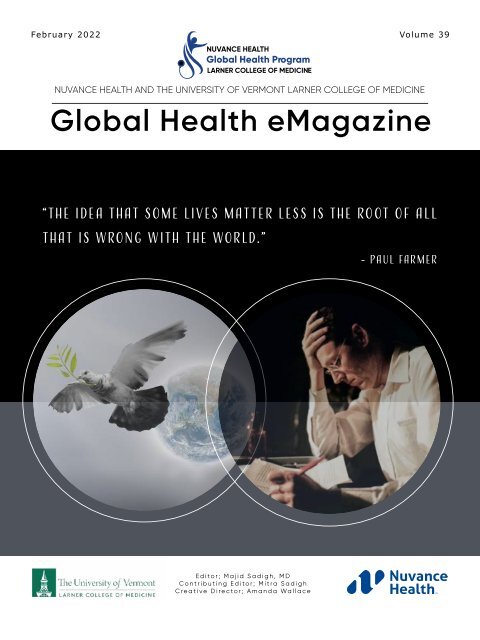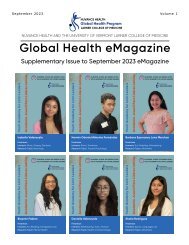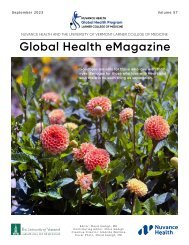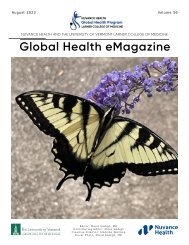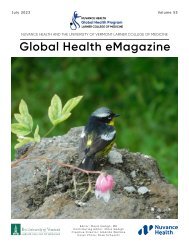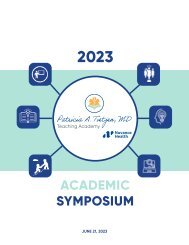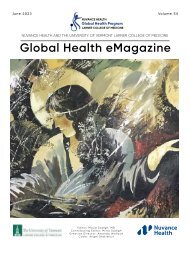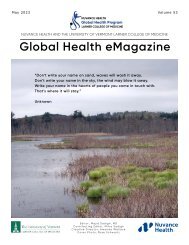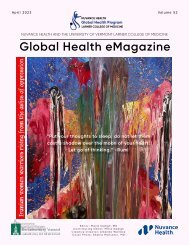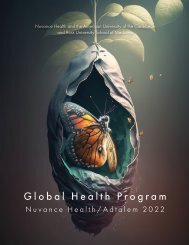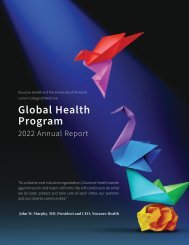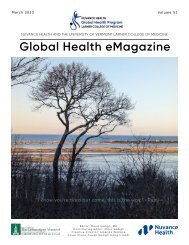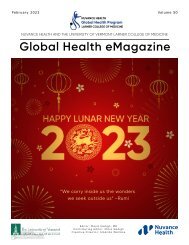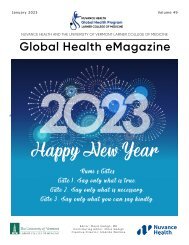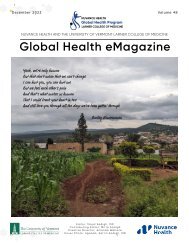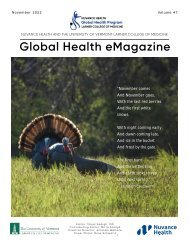Create successful ePaper yourself
Turn your PDF publications into a flip-book with our unique Google optimized e-Paper software.
February 2022 <strong>Volume</strong> <strong>39</strong><br />
NUVANCE HEALTH<br />
Global Health Program<br />
LARNER COLLEGE OF MEDICINE<br />
NUVANCE HEALTH AND THE UNIVERSITY OF VERMONT LARNER COLLEGE OF MEDICINE<br />
Global Health <strong>eMagazine</strong><br />
“The idea that some lives matter less is the root of all<br />
that is wrong with the world.”<br />
- Paul Farmer<br />
Editor; Majid Sadigh, MD<br />
Contributing Editor; Mitra Sadigh<br />
Creative Director; Amanda Wallace
OUR PEOPLE,<br />
OUR MISSION<br />
A NOTE FROM<br />
Majid Sadigh, MD<br />
Global Health<br />
<strong>eMagazine</strong><br />
<strong>March</strong> 2022<br />
Reaffirmed in Our Commitment<br />
Written by<br />
Majid Sadigh, MD<br />
Director of the Nuvance Health / University of Vermont<br />
Larner College of Medicine (NH/UVMLCOM) Global Health<br />
Program and Trefz Endowed Chair in Global Health<br />
A Note from Dr. Sadigh<br />
Reflections on 2021<br />
Highlights<br />
Nursing Division<br />
SARS COV-2 Pandemic<br />
and Us<br />
Unification<br />
Condolences: Paul Farmer<br />
Art to Remind Us of<br />
Who We Can Be<br />
Articles of the Month<br />
Videos of the Month<br />
Announcements<br />
Calendar<br />
Resources<br />
The Global Health Program at Nuvance Health / University of<br />
Vermont Larner College of Medicine is defined by an unwavering<br />
commitment to bidirectional, mutually dependent partnerships<br />
based in friendship and respect. Our program supports partner<br />
students and faculty through capacity building, site development,<br />
educational scholarships, and long-term mentorship. We nurture<br />
“brain gain” by rallying behind individuals who plan to return home to implement changes that<br />
they believe will empower their own communities. We build partnerships in which all members and<br />
leaders are co-owners of the program, and international partner sites can empower one another<br />
through autonomous alliances. Our program demonstrates that partnerships founded in friendship,<br />
trust, and respect allow for enduring, further reaching and more meaningful change.<br />
In 2019, our program supported visits by international partner faculty and leaders for a total of<br />
209 weeks, and we continued to host international partners for two to five months of continuing<br />
education in clinical, education, and research skills as part of our Global Health Scholars Program, a<br />
capacity building initiative. Meanwhile our international partners supported our students, residents,<br />
fellows, and faculty for a total of <strong>39</strong>5 weeks, mostly for the six-week global health elective, through<br />
which 65 medical students from the University of Vermont, American University of the Caribbean,<br />
and Ross University School of Medicine rotated.<br />
Among many noteworthy components of the program are Global Health at Home, a group<br />
advocating for marginalized populations in the U.S., and Linde Healthcare Educators Without<br />
Borders and Almira Healthcare Scholars, a multi-connected web of talented individuals with a<br />
shared mission of building capacity on-the-ground in the areas of medical education, research,<br />
leadership, and clinical skills, and rooted in Global South-Global South collaboration.<br />
We also piloted new innovations during the COVID-19 pandemic. Our “Bring the Field to the Zoom<br />
Class” initiative brings the patient’s environment to the virtual classroom, thereby familiarizing<br />
students with sociocultural aspects of medicine. These sessions begin with doctor-patient<br />
encounters and then follow patients to their residences. Another platform, “Virtual Open Forums<br />
with Friends and Colleagues Around the World”, discussing “hot topics,” followed by Q&A sessions<br />
with other partners, faculty, students, and community members, have allowed us to stay connected<br />
to our partners and communities.<br />
We also launched the COVID-19 Resource Center, featuring over 3000 biweekly summaries of the<br />
most up-to-date COVID-19 articles, which has been shared with our partners and reached over<br />
10,000 people globally. This resource aims to combat the COVID-19 “disinfodemic” which has led<br />
to distrust in science and exacerbated the digital divide for those lacking high-speed internet.<br />
Additionally, our weekly blog has received over 6,000 viewers from 102 countries and continues<br />
to feature stories from our partners through these turbulent times, while our monthly <strong>eMagazine</strong><br />
serves as a resource for all things global health from arts and humanities to clinical medicine.<br />
Our program is led by eighteen members comprising the Executive Committee, four from the<br />
Global North and fourteen from the Global South, which together shape the program’s content,<br />
structure, and direction through consensus building. This program would not be standing without<br />
the friendship, trust, unique talents, and insights of each and every one of our partners. We have<br />
created something beautiful together and move forward reaffirmed in our commitment to amplify<br />
the voices of the underserved.<br />
2
OUR PEOPLE,<br />
OUR MISSION<br />
Global Health<br />
<strong>eMagazine</strong><br />
<strong>March</strong> 2022<br />
REFLECTIONS ON 2021<br />
The Sunset of 2021<br />
Written by Sister Jane Frances Nakafeero<br />
Director of St. Francis Naggalama Hospital<br />
It was the last day of my Spiritual Retreat as I was seated at<br />
my desk looking through the window. The sunset captured my<br />
attention and I watched it for some time, knowing that the<br />
evening daylight would soon disappear. The rays were still<br />
penetrating through the branches of the trees while the rustle of<br />
banana leaves danced gently in the whispering evening breeze.<br />
It looked beautiful yet fierce. I witnessed the beauty right before<br />
my eyes and the amazing colors as it made its way down home.<br />
I saw an ending of the day, a change, a transformation and a<br />
promise of a new dawn.<br />
The ending was the reflection of the year past while the transformation and change were the fruits<br />
of time spent in reflection during the days of prayer. The new dawn was the year 2022.<br />
A Note from Dr. Sadigh<br />
Reflections on 2021<br />
Highlights<br />
Nursing Division<br />
SARS COV-2 Pandemic<br />
and Us<br />
Unification<br />
Condolences: Paul Farmer<br />
Art to Remind Us of<br />
Who We Can Be<br />
Articles of the Month<br />
Videos of the Month<br />
Announcements<br />
Calendar<br />
Resources<br />
2021 began in hope with New Year celebrations and resolutions before the COVID-19 pandemic<br />
swiftly continued its threatening of the whole world. We moved around with faces masked,<br />
sanitizers in our pockets, spaced apart and hands washed again and again. The pandemic was<br />
cruel, bringing restrictions that we all came to know: curfews, bans on public transport, closure<br />
of schools, piling debts, emerging mental health issues, fatigue, exhaustion, stress, pending staff<br />
salaries, bomb scares, with operational and fixed costs glaring at us straight in the face. Loved<br />
ones became sick and some died. Indeed, a call for support echoed on the horizon, generously<br />
tapping our tears and bringing us to our knees.<br />
As the sunset reflects the various patterns of life, one needs time for comfort, rest, reflection, and<br />
energy for a new beginning. The sun must set to bring the promise of a new dawn, a new hope, and<br />
tranquility. I reflected on the true meaning of a fresh start that every sunrise of 2022 would bring. A<br />
new page to be written. A new gift to refine my soul.<br />
Planning a new start, I realized that within each of us is the potential to live with excellence and<br />
determination to influence those around us in ways that make a positive difference and a yearning<br />
for peace.<br />
It is time to dare to begin again, to lock arms and hearts in taking up the tasks, impossible though<br />
it may seem, to make ourselves whole again. We must remind ourselves that the road to success<br />
is almost always under construction. Within each of us is a deepening for personal and global<br />
transformation that will lead to search for meaning in both arenas.<br />
There must be a wrestling with existential questions of what is mine to do and what is mine to be.<br />
It is only then that I shall be fully immersed in the Supreme power of the God Almighty who invited<br />
me away for the Spiritual Retreat. With the sunset gone, the reflection of a new beginning and<br />
atmosphere of the sunrise awakens my senses to search for ways to re-think, re-plan, re-group,<br />
and recover. While the continuous nurturing of the spirit and centering of my soul will, like flowers<br />
leave part of the fragrance in the hand that bestows them, I must acknowledge the Giver.<br />
Click here to visit the Nuvance Health<br />
Global Health Program<br />
COVID-19 Resource Center<br />
Reflections continued on next page >><br />
3
OUR PEOPLE,<br />
OUR MISSION<br />
Global Health<br />
<strong>eMagazine</strong><br />
<strong>March</strong> 2022<br />
Promises<br />
Written by Stephen Scholand, MD<br />
Associate Director of NH/UVMLCOM Global Health Program<br />
I held her heart in my hands.<br />
It seemed strong, it seemed healthy.<br />
It was a deep red, maroon color - saturated now in<br />
formaldehyde.<br />
The pathologist, an ancient figure, with bone-like hands<br />
pointed to the heart valves.<br />
His sharply curved knife, of a faded blue steel, had a<br />
worn wooden handle. It must have been used for centuries<br />
here in the basement of this hospital, this granite tomb.<br />
A Note from Dr. Sadigh<br />
Reflections on 2021<br />
Highlights<br />
Nursing Division<br />
SARS COV-2 Pandemic<br />
and Us<br />
Unification<br />
Condolences: Paul Farmer<br />
Art to Remind Us of<br />
Who We Can Be<br />
Articles of the Month<br />
Videos of the Month<br />
Announcements<br />
Calendar<br />
Resources<br />
I peered closer and could see the clots of bacteria adherent<br />
to the valves.<br />
“Vegetations” we called them.<br />
Those rubbery clots and filaments would break off into<br />
the circulation – wreaking destruction in the end organs.<br />
Her cause of death was due to infectious endocarditis<br />
from Staphylococcus aureus.<br />
She had said she wanted to live.<br />
She had promised me that she would give up drugs, if she<br />
could just get better.<br />
But the fevers kept coming, wave after wave of bacteria<br />
pulsed throughout her body.<br />
By injecting drugs, she had inadvertently inoculated<br />
these bacteria into her heart.<br />
It was too much for our therapy, the antibiotics could not<br />
clear the infection.<br />
Her ashen face was completely still, her violaceous lips<br />
were parted.<br />
Damn those drugs.<br />
Damn those Dark Lords who destroyed so many lives!<br />
A cold numbness enshrouded me.<br />
I would carry her memory on.<br />
I promised.<br />
4<br />
Reflections continued on next page >>
OUR PEOPLE,<br />
OUR MISSION<br />
Global Health<br />
<strong>eMagazine</strong><br />
<strong>March</strong> 2022<br />
Stay Human<br />
Written by Mahsheed Khajavi, MD<br />
This pandemic, with its deep human consequences along with<br />
its divisive social and economic upheaval has drawn attention<br />
to the vulnerability of our critical healthcare system.<br />
Heightened stress levels have frayed emotions and the general<br />
collective fear has resulted in angry social media disputes,<br />
flaming emails, and raised voices in all venues of expression.<br />
During these times, it is often easier to accept some version of “thickening one’s skin” and becoming<br />
more mechanical and emotionally distant.<br />
I have heard this from colleagues and watched as many become so distant that they no longer<br />
derive any pleasure or meaning from the mission of medicine.<br />
Midway through 2021, I found myself in this same group. Waking up and thinking about getting<br />
through rather than getting into my day was the best I could achieve. I would fall out of my bed,<br />
go through the ritual of daily preparation, drive with my NPR station discussing SARS-CoV-2, and<br />
tune out.<br />
A Note from Dr. Sadigh<br />
Reflections on 2021<br />
Highlights<br />
Nursing Division<br />
SARS COV-2 Pandemic<br />
and Us<br />
Unification<br />
Condolences: Paul Farmer<br />
Art to Remind Us of<br />
Who We Can Be<br />
Articles of the Month<br />
Videos of the Month<br />
Announcements<br />
Calendar<br />
Resources<br />
I would walk into the hospital with a census of 45 patients, the majority of whom had respiratory<br />
failure from COVID-19 multifocal pneumonia. Returning home after 16 or 18 hours, I would skim JAMA<br />
and NEJM for any new reports or changes in guideline-directed therapy.<br />
Becoming less and less present with those around me, the idea of putting my backpack on and<br />
going for a walkabout was the most satisfying desire.<br />
I thought back to my years of medical school and training. The advice, sometimes implicit and<br />
sometimes overt, was that as a physician I had to develop emotional distance. Otherwise, I would<br />
be utterly overwhelmed and unable to complete my duties.<br />
I remember an attending telling me “you will lose your intellectual acumen if you take these patients<br />
home with you.” This was in Atlanta during the early AIDS epidemic. This was the time when Grady<br />
Hospital placed eight patients in each room on the AIDS floor, the vast majority of whom were<br />
emaciated and unable to stand without assistance.<br />
I remember quietly condemning this philosophy. Although I could not articulate my understanding<br />
then, I believe that on some level there was an innate and intuitive knowledge that without empathy,<br />
both patients and caretakers would be compromised.<br />
Twenty-seven years later I found myself becoming the person I had so easily condemned. I told<br />
myself to “toughen up” if I did not want to end up on the shower floor sobbing each night. I convinced<br />
myself that creating an emotional barrier would help me continue to work in a clinical atmosphere<br />
that, up until this point, I had never experienced.<br />
I could not have been more misguided. I can’t say when or how I lost myself and truthfully, I can’t<br />
really say when I came back.<br />
I think part of my return came after reading an article on physician burnout. The article noted that<br />
about half of all physicians reported burnout last year, highest among those who worked in the<br />
hospital and intensive care units.<br />
The article discussed the fact that burnout caused emotional distancing and that the cudgel of<br />
“emotional weakness” was a long and ingrained tenant of medicine.<br />
And somehow, I realized that demanding “toughness” only resulted in my inability to experience the<br />
full range of emotions necessary to connect with my patients.<br />
I had this backwards. It was not burnout which caused my lack of empathy. It was my deliberate<br />
decision to distance myself (in order, in some bizarre way of thinking, to keep myself intact) which<br />
had caused my burnout.<br />
5<br />
Reflections continued on next page >>
OUR PEOPLE,<br />
OUR MISSION<br />
Global Health<br />
<strong>eMagazine</strong><br />
<strong>March</strong> 2022<br />
Yes, lack of sleep and erratic days are difficult. Yes, having such a large-scale lack of knowledge is<br />
difficult. Yet this was the case as an intern and I certainly never felt shut down.<br />
It is (fortunately) futile to believe that as physicians, we can be impervious to emotions. Perhaps<br />
our burnout is from the mistaken notion that we need to continually desensitize and ultimately<br />
disengage.<br />
This past year has been long, arduous, often overwhelming and unsettling.<br />
But I am getting back into my day. I have learned that by maintaining my ability to feel-especially<br />
that which is most difficult and painful- allows me to stay human and maintain my own self-care<br />
as well as meaning in my work and mission.<br />
A Note from Dr. Sadigh<br />
Reflections on 2021<br />
Highlights<br />
Nursing Division<br />
SARS COV-2 Pandemic<br />
and Us<br />
Unification<br />
Condolences: Paul Farmer<br />
Art to Remind Us of<br />
Who We Can Be<br />
Articles of the Month<br />
Videos of the Month<br />
Announcements<br />
Calendar<br />
Resources<br />
A Gray Fox (Elina Mukhametshina)<br />
6
OUR PEOPLE,<br />
OUR MISSION<br />
Global Health<br />
<strong>eMagazine</strong><br />
<strong>March</strong> 2022<br />
How Life Has Been in the World of a Pandemic:<br />
Dispatch from Thailand<br />
Written by Atthayaporn Choomai, MD<br />
Walailak University School of Medicine, Thailand<br />
Since the COVID-19 outbreak in December 2019, daily life<br />
underwent significant change. Despite coming after the<br />
outbreaks in China, the U.S., and Europe, it has been very<br />
damaging. It brought our economy to a standstill and ultimate<br />
collapse while putting our healthcare system under severe strain.<br />
People suffered due to the lack of effective vaccines, policies for<br />
controlling the spread of disease, and facts about COVID-19.<br />
In May 2020, Thailand was in crisis. The disease overwhelmed us. People died at home in our<br />
capital Bangkok without knowing the cause of illness until after they died. Announcements were<br />
made to welcome city-dwellers back to their hometowns if they needed any healthcare provision,<br />
as the hospital situation in Bangkok had collapsed. Our hospital in Thasala received many more<br />
COVID-19 patients as a result, including from other provinces.<br />
Sadly, we lost hundreds of patients to COVID-19 during this time. Healthcare providers were<br />
overworked and exhausted. It took a heavy toll on us. Even non-COVID-19 infected patients had<br />
problems because of the strain on our hospital.<br />
A Note from Dr. Sadigh<br />
Reflections on 2021<br />
Highlights<br />
Nowadays, things have improved. Our immunization rate is close to 80%. In Thasala Hospital, cases<br />
have decreased despite the appearance of the Omicron variant.<br />
Things are slowly improving, including the economy. I believe we can weather this storm. We look<br />
forward to the prospect of welcoming tourists and global health colleagues from around the world<br />
to explore the beautiful landscape and culture of Thailand.<br />
Nursing Division<br />
SARS COV-2 Pandemic<br />
and Us<br />
Unification<br />
Condolences: Paul Farmer<br />
Art to Remind Us of<br />
Who We Can Be<br />
Articles of the Month<br />
Videos of the Month<br />
Announcements<br />
Calendar<br />
Resources<br />
Quellon, Chile (Elina Mukhametshina)<br />
7<br />
Reflections continued on next page >>
OUR PEOPLE,<br />
OUR MISSION<br />
Global Health<br />
<strong>eMagazine</strong><br />
<strong>March</strong> 2022<br />
Work is in the Word<br />
Written by Saida Agliullina, MD<br />
Global Health Scholar and Assistant Professor at Kazan State<br />
Medical University, Russia Medical University, Russia<br />
For me, 2021 was a good year. If I recall it in one word, WORK is<br />
the word.<br />
Every day I WORK on myself and try to be a good mom. I read<br />
special information to pass it to my son in an accessible form.<br />
There are many dangers in our world. As a mother, the main<br />
person in my son’s life, I have to teach him how to react in certain<br />
situations and what to do to grow smart and healthy.<br />
At the university, we WORK very hard to teach our students and residents who help provide healthcare<br />
in the fight against the COVID-19 pandemic. We are still waiting for the end of the pandemic so<br />
that they can devote more time to learning, especially as there are still many unresolved problems<br />
in healthcare besides COVID-19.<br />
A Note from Dr. Sadigh<br />
Reflections on 2021<br />
Highlights<br />
Nursing Division<br />
SARS COV-2 Pandemic<br />
and Us<br />
Unification<br />
Condolences: Paul Farmer<br />
Every day I WORK on myself and try to become a good specialist. There is a lot of good literature<br />
and online courses available now, so I have no problems getting reliable information. In 2021, I took<br />
several online courses on writing scientific articles. My first scientific article was published in 2016,<br />
and was followed by a dozen more publications. Looking back, I know the mistakes I made. My plan<br />
is to improve the quality of research planning and writing based on the results obtained. In 2022,<br />
I want to publish in an international magazine in English. I believe I will succeed because the goal<br />
has been set. I also took several online courses in English last year, and have developed the habit<br />
of studying English every day. I felt the result towards the end of the year as it became easier for<br />
me to teach classes with international students.<br />
Every day I WORK on myself and try to maintain my health. In 2021, I was examined by several<br />
doctors about conditions I was worried about. I’m glad everything is fine with me. My teeth were<br />
cured; thereby I eliminated the foci of chronic infection. Now I live with the understanding that health<br />
should be protected from a young age. I’m trying to convey this idea to my son so that I can be an<br />
example in protecting my own health. In 2021, I also acquired the habit of doing morning exercises<br />
every day. I monitor my diet, eating vegetables and fruits daily. I try to reduce the consumption of<br />
junk food. It’s a daily WORK, but I like it.<br />
It was a fruitful year. There is a lot of work now, but the further I go, the more interesting it becomes.<br />
Art to Remind Us of<br />
Who We Can Be<br />
Articles of the Month<br />
Videos of the Month<br />
Announcements<br />
Calendar<br />
Resources<br />
Hawk (Rose Schwartz)<br />
8<br />
Reflections continued on next page >>
OUR PEOPLE,<br />
OUR MISSION<br />
Global Health<br />
<strong>eMagazine</strong><br />
<strong>March</strong> 2022<br />
I Hope to See My Parents Soon<br />
Written by Albert Trondin, MD<br />
Neurosurgeon, San Carlos Clinical<br />
Hospital, Madrid, Spain<br />
These last two years were important for<br />
me because I finished my residency. I<br />
started working at night and just a few<br />
months ago became a part of the staff<br />
of the department.<br />
I enthusiastically look forward to working<br />
hard and continuing learning more and<br />
more. There is a long way to go!<br />
I’m pleased to see the pandemic is more<br />
or less under control here in Spain, and<br />
life returning to normal. Nonetheless I’m<br />
waiting for the borders to open so that<br />
I can see my parents soon. European<br />
countries’ travel restrictions are still<br />
not allowing Russian tourists with the<br />
Sputnik vaccine to enter Spain.<br />
A Note from Dr. Sadigh<br />
Reflections on 2021<br />
Highlights<br />
Nursing Division<br />
SARS COV-2 Pandemic<br />
and Us<br />
Unification<br />
Condolences: Paul Farmer<br />
Art to Remind Us of<br />
Who We Can Be<br />
Articles of the Month<br />
Videos of the Month<br />
Announcements<br />
Calendar<br />
Resources<br />
Red Fox (Amanda Wallace)<br />
Reflections continued on next page >><br />
9
OUR PEOPLE,<br />
OUR MISSION<br />
Global Health<br />
<strong>eMagazine</strong><br />
<strong>March</strong> 2022<br />
A Note from Dr. Sadigh<br />
Reflections on 2021<br />
Highlights<br />
Nursing Division<br />
SARS COV-2 Pandemic<br />
and Us<br />
Unification<br />
Condolences: Paul Farmer<br />
Art to Remind Us of<br />
Who We Can Be<br />
Articles of the Month<br />
Videos of the Month<br />
Announcements<br />
Calendar<br />
Resources<br />
and perspectives as New Americans.<br />
Tuesday began with an Ethics in Global<br />
Health workshop, followed by a casebased<br />
learning session on Migrant<br />
Health, which included our partners<br />
at Chiricahua Community Health<br />
Centers, Inc. in Arizona, and Bridges to<br />
Health at UVM, offering perspectives<br />
from both the northern and southern<br />
borders. Tuesday afternoon we were<br />
delighted to welcome our partners<br />
from Zimbabwe and Uganda, first for<br />
an impactful session on Decolonizing<br />
Global Health and followed by casebased<br />
learning on the Approach to<br />
Tropical Diseases in resource-limited<br />
settings.<br />
Panel on decolonization of global health at Global<br />
Health Bridge, UVMLCOM<br />
HIGHLIGHTS<br />
Global Health Bridge Week for the Class of 2023<br />
Written by Aurdree Frey, MPH<br />
Coordinator of the Global Health Program at UVMLCOM<br />
On January 31 through February 3, 2022, the Global Health Bridge course<br />
Andrea Green, MD<br />
was held for University of Vermont medical students in the class of 2023.<br />
This is a highly interactive course, with workshops Professor held of Pediatrics on many relevant<br />
topics, beginning with small group projects Director on of the the Global Global Burden of<br />
Health Program in the<br />
Disease and Priority setting on Monday morning. Monday afternoon<br />
Department of Pediatrics<br />
we welcomed guests from our New American at UVMLCOM community in Burlington<br />
for a Culture and Health session where students learned cultural<br />
humility strategies and heard from our guests about their experiences<br />
Child Health and the Gendered Impact of Global<br />
Health workshops started the day on Wednesday,<br />
followed by the Environmental Impact on<br />
Humanitarian and Migration Health in the afternoon<br />
during which students worked on a tabletop exercise<br />
using the UN Interagency Standing Committee’s<br />
cluster approach to humanitarian disasters. Thursday<br />
began with a Great Debate in which students were<br />
assigned to groups either for or against controversial<br />
topics such as genetically modified mosquitoes, how<br />
governments from the Global North should or should<br />
not intervene in emergencies in the Global South,<br />
and whether or not high-income countries should<br />
give COVID boosters while many in low- and middleincome<br />
countries still need a first dose. Next was<br />
a workshop on Human Trafficking which featured<br />
local experts in the field, and the week concluded<br />
with a very timely session on Pandemic response.<br />
The students were highly engaged and enthusiastic<br />
about the topics, making for an impactful and<br />
enjoyable week for all participants.<br />
10
OUR PEOPLE,<br />
OUR MISSION<br />
Global Health<br />
<strong>eMagazine</strong><br />
<strong>March</strong> 2022<br />
NURSING DIVISION<br />
Editor:<br />
Catherine Winkler, PhD, Nurse Practitioner - BC<br />
Written by<br />
Catherine Winkler, PhD, Nurse Practitioner - BC<br />
Director of the Nursing Division at the Nuvance Health Global<br />
Health Program, Nursing Division Editor<br />
What is Next After Covid? A Nurse’s Response<br />
The Nursing Division of the Global Health Department grew<br />
over the last year, building relationships with our colleagues<br />
in academia and in medicine. Further, we have expanded<br />
scholarship and research discussions to encompass Global<br />
North and South projects, education, and research.<br />
A Note from Dr. Sadigh<br />
Reflections on 2021<br />
Highlights<br />
Nursing Division<br />
SARS COV-2 Pandemic<br />
and Us<br />
Unification<br />
Condolences: Paul Farmer<br />
Art to Remind Us of<br />
Who We Can Be<br />
Articles of the Month<br />
Videos of the Month<br />
Announcements<br />
Calendar<br />
Resources<br />
This year, the nursing division together with the director explored opportunities that would contribute<br />
to global health work in the short-term given the constraints associated with COVID-19 as well as<br />
long-term projects that we plan to institute once COVID-19 infections decline and/or become less<br />
virulent.<br />
We had international authors contribute to the Global Health <strong>eMagazine</strong> on the nursing platform and<br />
shared their clinical experiences. We also have a women’s health blog supported by Sarah Cordisco,<br />
a student nurse from UVM that has created a shared space for women’s health conversations.<br />
Earlier this year, Linde awarded the Global Health Department a scholarship that extends over<br />
seven years named in honor of Anne Roby and supports two nursing students: one graduate and<br />
one undergraduate to travel with the medical team to one of our partner international locations.<br />
Currently, we are working closely with Western Connecticut State University (WCSU) to establish this<br />
global health scholarship and to develop a bidirectional education program. Through bidirectional<br />
education, established sustainability and longitudinal relationships the Global Health Department<br />
encourages our staff and students to become global health advocates.<br />
Several of the nurses have joined the Global Health Academy in preparation for teaching in their<br />
respective areas of expertise. In 2021, class content was developed for the ACCESS School in Uganda.<br />
The courses included Personal and Communal Health, Foundations of Nursing, and COVID-19<br />
Update. Plans will be made for additional courses or assistance with curriculum development in<br />
2022. Twelve modules were developed by Sarah on women’s health issues as well and are available<br />
online for all our associates to access.<br />
A global health steering committee formed in 2020 has expanded to become the Global Health<br />
Nurse Executive Committee in 2021 with members from the Global North and South as well as from<br />
academia and the Nuvance Healthcare system. We will conduct collaborative research in the areas<br />
of women’s health, COVID-19, E-Learning, and child development. Further areas of research will<br />
be added as we move forward together with students and their faculty on shared international<br />
projects.<br />
Additional plans for 2022 are finalization of the agreement between WCSU and Nuvance Health,<br />
a virtual Grand Rounds, additional writers to contribute to the global health magazine, and<br />
participation in research, education, and leadership projects.<br />
11
OUR PEOPLE,<br />
OUR MISSION<br />
A New Series:<br />
SARS-COV2 PANDEMIC AND US<br />
Global Health<br />
<strong>eMagazine</strong><br />
<strong>March</strong> 2022<br />
A Nursing Professor’s Perspective in Teaching<br />
During a Pandemic<br />
Part 1<br />
Written by Monica Sousa Ed.D, ACNS-BC, APRN<br />
Professor of Nursing at Western Connecticut State University<br />
A Note from Dr. Sadigh<br />
Reflections on 2021<br />
Highlights<br />
Nursing Division<br />
SARS COV-2 Pandemic<br />
and Us<br />
Unification<br />
Condolences: Paul Farmer<br />
Art to Remind Us of<br />
Who We Can Be<br />
Articles of the Month<br />
Videos of the Month<br />
Announcements<br />
Calendar<br />
Resources<br />
I will always remember being in the meeting with faculty, the<br />
department of nursing chair, and the dean on Wednesday, <strong>March</strong><br />
11, 2020 when we discussed how this new virus that seemed so<br />
far away from us was now in our backyard. We tried to think<br />
of scenarios of what might be happening, how we would meet<br />
clinical hour requirements if we had to go virtual, what faculty<br />
might need to teach online, what equipment would be required,<br />
and the resources students might need to learn in the virtual<br />
environment. At the time we had no idea what a long rough road was ahead of us. Two days later,<br />
our university along with all the schools in our area closed. The anxiety of not knowing what was<br />
happening loomed large, as did the fear of getting sick and wondering what I would do if any of<br />
my family members contracted COVID-19.<br />
I do not think I slept that weekend. We thought that since the following week was spring break<br />
we would isolate for the week and be back the next week. However, before the weekend had<br />
ended, we received a flood of emails that the university was going virtual for the remainder of the<br />
semester. The anxiety, worry, and fear intensified tremendously. So many questions raced through<br />
my head constantly. How was I going to prepare myself and my children during this chaotic time?<br />
How was I going to educate nursing students in their last two months of school before graduation<br />
and prepare them to take their state board nursing exam while teaching online? How was I going to<br />
be there for my students and colleagues? How do I plan for something I have never experienced?<br />
Over spring break, I went to campus to bring everything I could think of home that I would or could<br />
need for class, committee meetings, and projects I had been working on. I had no idea exactly<br />
what I needed but figured I might as well bring everything just in case. It was an eerie feeling to<br />
walk onto campus. It was like a ghost town with a strange and unsettling vibe. I wondered when I<br />
would see students back in the classroom and have meetings with colleagues in the same room.<br />
I went home to figure out a plan to manage everything. At home, I had to help my two young<br />
daughters with their online schooling, find a babysitter to come to the house so I could work, and<br />
figure out how to get groceries and household essentials. For work, I had to think about how to<br />
convert all class materials to the online environment, prepare graduating nursing students to enter<br />
the profession in the middle of a pandemic, and provide support to students as they struggled with<br />
a mode of education they did not sign up for or prepare for. So many balls up in the air and I just<br />
prayed that they would fall in line eventually.<br />
I met with faculty via video conferencing to discuss our next steps and how to move coursework<br />
to the online environment. The university was great at providing resources and training regarding<br />
teaching in the online environment. The nursing department was extremely fortunate to have most<br />
of the faculty using the learning management system (i.e., Blackboard) regularly for our classes.<br />
Prior to the COVID-19 pandemic, Blackboard was used to post lecture PowerPoints, class resources,<br />
assignments, discussion questions, etc. It was primarily a place to house course material and submit<br />
assignments. Due to many factors the university decided that courses would be asynchronous. This<br />
meant students and faculty did not meet at a regularly scheduled time. Lecture material would be<br />
posted, and assignments would be submitted online by the due date.<br />
Pandemic and Us continued on next page >><br />
12
OUR PEOPLE,<br />
OUR MISSION<br />
Global Health<br />
<strong>eMagazine</strong><br />
<strong>March</strong> 2022<br />
A Nursing Students’s Perspective During a<br />
Pandemic<br />
Written by Sarah Cordisco<br />
Senior Nursing Student at the University of Vermont<br />
The COVID-19 pandemic has greatly impacted my college<br />
education. As a senior nursing student, I am disappointed that<br />
it has had such a profound impact on my education and new<br />
career. The pandemic that created staffing shortages, unsafe<br />
nursing assignments, and an unheard of number of deaths, while<br />
revealing the many holes in our healthcare system. It has entirely<br />
shifted my view of nursing.<br />
The expected feelings of anxiety and excitement that come with starting a career, have become<br />
muddied with worsening fears and worries about the future state of health care, staff safety, and<br />
patient safety. The burnout healthcare workers are facing is unlike any before and it is disheartening<br />
that I need to consider this in myself before I have even completed my education. It becomes<br />
depressing to see nurses in person, and on social media express their feelings of hopelessness and<br />
despair over the state of our current health system. These feelings are reflected in how our current<br />
nursing leaders and mentors teach us students, how they provide patient care, and how they treat<br />
those around them.<br />
A Note from Dr. Sadigh<br />
Reflections on 2021<br />
Highlights<br />
Nursing Division<br />
SARS COV-2 Pandemic<br />
and Us<br />
Unification<br />
Condolences: Paul Farmer<br />
Art to Remind Us of<br />
Who We Can Be<br />
Articles of the Month<br />
Videos of the Month<br />
Announcements<br />
I have yet to start my official position as an RN, however, I had been working as a resident care<br />
assistant caring for patients with Alzheimer’s while in school. During the first wave, I had first hand<br />
experience with death, illness, staffing shortages, and serious health concerns. In many ways, I<br />
already feel the burnout. The extra stress created by the pandemic has caused many of my peers<br />
to question the field they have chosen. At one point I even questioned it.<br />
What I learned about nursing at the beginning of college has been completely altered to fit<br />
pandemic nursing. We have had to change how we learn and practice nursing considering a whole<br />
different dimension. Like other college students, the pandemic forced me to learn in a remote<br />
capacity. While professors did the best they could, online classes were not nearly as rich as in<br />
person. Zooming into class created massive issues. There were constant tech problems, and I found<br />
it incredibly difficult to concentrate and stay focused. More difficulties arose when we had group<br />
projects and exams. This made my junior year of college even more difficult than it already was.<br />
I find it hard to feel prepared for my future job, as I am entering a profession during an unprecedented<br />
time. I’ve had to come to terms with the fact that my professors cannot prepare me for this, as they<br />
have not experienced it themselves. They have tried to give me the education and experience to<br />
be a nurse, but no one was prepared to be a nurse in a pandemic.<br />
Despite all this, I can say I have learned a lot from experiencing a pandemic. I have learned how<br />
to be more adaptable, self-reliant, and resilient. I have gained skills and new ways of thinking that<br />
otherwise would have only happened with years of experience. All the pressure and changes I have<br />
dealt with, will make me a better nurse and my practice will benefit in the future. It can be hard to<br />
think about the future when you look at the world around you, but there is a future. We don’t know<br />
what it will look like, or how it will function, but it will be there. And hopefully, we will have made the<br />
changes necessary to better support our students, nurses and patients.<br />
Calendar<br />
Resources<br />
Click here to visit the Nuvance Health<br />
Global Health Program COVID-19<br />
Resource Center<br />
Pandemic and Us continued on next page >><br />
13
OUR PEOPLE,<br />
OUR MISSION<br />
Global Health<br />
<strong>eMagazine</strong><br />
<strong>March</strong> 2022<br />
COVID-19: Reflections from a Russian Resident<br />
Physician<br />
Part 1<br />
Written by Aliya S. Zakirova, MD<br />
PGY-1, Primary Care, Kazan State Medical University, Kazan,<br />
Republic of Tatarstan, Russian Federation<br />
I first heard about COVID-19 at the Department of Infectious<br />
Diseases. It was Spring of 2019, and coincidentally we were taking<br />
a course on respiratory infections. The first cases of infection<br />
had appeared in China. At that time, it was difficult for us to<br />
imagine the scale of this infectious disease. We learned about<br />
the disease only through our teachers and mass media. We tried<br />
to find information about coronavirus diseases in textbooks, but<br />
there was almost none.<br />
At the end of February 2020, tourists from the “Diamond Princes” cruise liner were evacuated to<br />
Kazan from Tokyo, Japan. They were placed in separate isolation units at the infectious diseases<br />
hospital. This was our first encounter with COVID-19 patients and we were trained with the help of<br />
these cases. It was then I realized that the infection was at our doorstep. I was both curious about<br />
what was going on and also terrified of an unknown new disease.<br />
A Note from Dr. Sadigh<br />
Reflections on 2021<br />
Highlights<br />
Nursing Division<br />
SARS COV-2 Pandemic<br />
and Us<br />
Unification<br />
Condolences: Paul Farmer<br />
Art to Remind Us of<br />
Who We Can Be<br />
Articles of the Month<br />
Videos of the Month<br />
Announcements<br />
Calendar<br />
Resources<br />
After some time, the first imported cases began to appear throughout Russia. Hospitals began<br />
to prepare red zones, isolation wards, new triage zones, and train the medical and paramedical<br />
staff. The country was in lockdown (quarantine) and we moved to distance learning. The ease of<br />
online messengers and conferences provided us with virtual access to all colleagues without any<br />
exceptions, even those who, in other circumstances, we would never have invited to our home. It<br />
was very unusual and difficult for me to study remotely. We analyzed the theory, solved clinical<br />
cases, but we did not have the opportunity to communicate with live patients and there were not<br />
enough live patient discussions.<br />
The system of medical education in Russia<br />
is designed in a way that it allows third-year<br />
medical students to obtain a nursing certificate<br />
by taking special exams. I took this opportunity<br />
to learn more about all the diseases and<br />
develop skills in communicating with patients.<br />
Upon passing all the exams and obtaining the<br />
license, I started working in the department of<br />
medicine as a nurse. This allowed me to closely<br />
work with patients infected with COVID-19 and<br />
have a better understanding of the diseases<br />
as well as patients’ sufferings. This also helped<br />
hone my skills. I could boldly communicate<br />
with patients, felt confident, and learned to<br />
do many interventions, much faster and more<br />
accurately. I began to understand diseases<br />
and recognize them. Sometimes it was very<br />
interesting because there were differences<br />
between real life cases and theory.<br />
As the number of infected people increased,<br />
patients infected by SARS-Cov-2 began<br />
to appear in areas that were previously<br />
untouched. At first, it was not clear how to<br />
behave when meeting a friend or a colleague:<br />
A hug? A handshake? When it’s a close friend<br />
or a relative and you really want to hug, what<br />
should you do? Meet in-person or simply chat using a messenger? Where was this person before<br />
meeting you? Do they use hand sanitizer? Do they wash their hands? Is it okay to sit next to each<br />
other on a bench or just sit and maintain appropriate distance? Is it polite to ask if they are ill, or<br />
simply inquire about their health? What’s next? Plenty of questions with few answers.<br />
Pandemic and Us continued on next page >><br />
14
OUR PEOPLE,<br />
OUR MISSION<br />
Global Health<br />
<strong>eMagazine</strong><br />
<strong>March</strong> 2022<br />
I Am Still Trying to Catch up With My Academic<br />
Journey<br />
Part 1<br />
Written by Natukunda Ferguson<br />
Medical Student, MakCHS<br />
I am a third-year medical student at Makerere University,<br />
Uganda pursuing a Bachelor’s degree in Medicine and<br />
Surgery which is a five-year program.<br />
On the evening of <strong>March</strong>, 18, 2020 as I was seated in the library<br />
preparing for my immunology progressive exam that was due<br />
the following day, H.E. Yoweri Kaguta Museveni announced<br />
a one-month lockdown during the presidential address due<br />
to the COVID-19 pandemic. It targeted gathering places,<br />
schools and institutions of higher education inclusive.<br />
At that instant, I felt relieved that I was getting a short break from the hectic school routine to relax<br />
and prepare more extensively for forthcoming progressive and summative second-year, second<br />
semester exams. I also did not want to get infected with the coronavirus that made news all over<br />
the world, spreading like wildfire from Wuhan, China to reach Uganda in just a blink of an eye.<br />
A Note from Dr. Sadigh<br />
Reflections on 2021<br />
Highlights<br />
Nursing Division<br />
SARS COV-2 Pandemic<br />
and Us<br />
Unification<br />
Condolences: Paul Farmer<br />
Art to Remind Us of<br />
Who We Can Be<br />
Articles of the Month<br />
Videos of the Month<br />
Announcements<br />
Calendar<br />
I packed my belongings that night andboarded the earliest Gateway bus from Kampala Capital<br />
City to my home district Ntungamo the following morning. I planned for the short holiday and<br />
used the first two weeks to rest before resuming revision the third week. I closely followed media<br />
updates as those who tested positive increased with each day that passed and by instinct, I felt<br />
that opening schools after one month would not be possible.<br />
As the month came to a close, the president addressed the nation again, pushing the lockdown<br />
for another twenty-one days. Extending the lockdown then became the order of the day. Fourteen<br />
days, twenty-one days, fourteen days again and so forth to the extent that it became a slogan that<br />
each time the president addressed the nation, the phrase “schools to remain closed for another<br />
twenty-one or so days” was never missed. With the consecutive extensions of the lockdown, I<br />
gradually lost hope of returning to school. COVID-19 cases continued to skyrocket which scared<br />
me as I could imagine the stigma of testing positive and being isolated from the people I love. The<br />
pace at which I was revising books kept on getting low, the home environment was unfavorable for<br />
studying and the zeal to keep up kept reducing.<br />
Two months down the road I completely lost the motivation to study and decided to find other<br />
ways of keeping busy and productive. I started reading novels, something I had never done in<br />
my entire life. It was boring at the start but got interesting along the way. I started with Stephen<br />
Covey’s Ten Habits of Highly Effective People and then read Paulo Coelho’s The Alchemist which<br />
were recommendations from friends. I also became more involved in helping with housework, going<br />
to the garden and farms, and started a poultry rearing farm. I watched a few movies, the famous<br />
dance party on NBS television, and played board games with my siblings.<br />
After spending four months at home, the things that interested me earlier no longer did. Days<br />
seemed like weeks. I could clearly see that my medical career was at stake. I started feeling that I<br />
would not make a good doctor, and would be older by the time I finished school. The graduation<br />
date was moving further and further away. I could no longer see my plans of pursuing postgraduate<br />
studies, marrying, or making money coming true.<br />
Resources<br />
Click here to visit the Nuvance<br />
Health Global Health Program<br />
COVID-19 Resource Center<br />
Pandemic and Us continued on next page >><br />
15
OUR PEOPLE,<br />
OUR MISSION<br />
A Ugandan Student’s Education in the Foil of the<br />
COVID-19 Pandemic<br />
Part I<br />
Written by Abraham Ddungu Matovu<br />
Global Health<br />
<strong>eMagazine</strong><br />
<strong>March</strong> 2022<br />
Medical Student, MakCHS<br />
I was in the second year of a five-year course to obtain a<br />
Bachelor’s degree of Medicine and Bachelor’s degree of Surgery<br />
when the president of Uganda officially aired on television<br />
and radio that our beloved country was under attack from an<br />
invisible enemy, one that our own gallant army could not defend<br />
us from; an enemy that required the populace to retreat from the<br />
battlefield in order to survive. The president, his excellency Yoweri<br />
Museveni, informed the country that this enemy’s behavior needed to be studied by our professional<br />
medical doctors in order to tackle it well. This enemy was the COVID-19 pandemic whose origins<br />
are reportedly traced to Wuhan City in China. He thus declared a nationwide lockdown on all<br />
political, social, and economic events on <strong>March</strong> 18, 2020. This meant that all learning institutions<br />
were paused to reduce the rate of disease spread. I left the university and headed home to go<br />
through the lockdown with my family.<br />
A Note from Dr. Sadigh<br />
Reflections on 2021<br />
Highlights<br />
Nursing Division<br />
SARS COV-2 Pandemic<br />
and Us<br />
Unification<br />
Condolences: Paul Farmer<br />
Art to Remind Us of<br />
Who We Can Be<br />
There ensued a cantankerous period of uncertainty as an increased cumulative number of positive<br />
COVID-19 tests was reported every day and the death toll only grew higher with the country<br />
running short on medical equipment and drugs. This led to extension of lockdowns in bits by the<br />
president. It was like a drug prescription that he did not want to force down citizens’ throats,<br />
but rather administered it in periods of three weeks, four weeks, two months as per his scientific<br />
advisory judgment. I never got COVID-19 but many friends and families were devastated by the<br />
viral disease. We were kept out of school for a record seven months! I used this time to read books<br />
and venture into a few agribusinesses particularly, coffee and watermelon trading, which was an<br />
awesome experience. My watermelon business enabled people to access the craved vitamin C<br />
which boosted their immunity. As a medical student, I played a part in sensitizing people in my<br />
community of Sembabule district located in central Uganda about the Standard Operational<br />
Procedures including the wearing of face masks and social distancing.<br />
In October 2020, medical students were allowed back to university by the president as there was<br />
a need to train more soldiers for this war against COVID-19, and doctors were the soldiers. I was<br />
part of this team that reported to school in October 2020. My academic incarceration by the<br />
pandemic seemed to be finished. I was immediately ushered into a new online system of education<br />
which robbed the sweet touch of physical studies. We began Zoom lectures as practical sessions<br />
became increasingly inaccessible. Through this entire hustle and bustle, I was able to complete the<br />
interrupted second year of medical school.<br />
Articles of the Month<br />
Videos of the Month<br />
Announcements<br />
Calendar<br />
Resources<br />
Swan on the Housatonic River (Rose Schwartz)<br />
16
OUR PEOPLE,<br />
OUR MISSION<br />
Global Health<br />
<strong>eMagazine</strong><br />
<strong>March</strong> 2022<br />
A Note from Dr. Sadigh<br />
Reflections on 2021<br />
Highlights<br />
UNIFICATION<br />
Ukraine and the lessons of Alexander Herzen<br />
Written by Richard Horton<br />
Lancet <strong>March</strong> 05, 2022<br />
Scientists must work towards a more convergent and less<br />
divided world—for national as well as human security.<br />
Last week, WHO convened a forum to review lessons<br />
from research into COVID-19. My task was to identify<br />
the challenges to ensuring the best science was<br />
published as quickly as possible. The first challenge<br />
was that a global pandemic demanded a global<br />
science—an international network of scientists able<br />
to communicate freely with one another. A second<br />
challenge was that global science depends on global<br />
trust. And global trust depends on open collaboration<br />
with scientists in all countries. Scientists must build trust with<br />
other scientists, irrespective of their national origin. We must<br />
support one another in the face of often hostile political criticism<br />
to provide the most reliable evidence to decision makers. As Herzen wrote “an exclusive feeling<br />
of nationality is never productive of good”. Inadvertently isolating Russian scientists and health<br />
workers will be self-defeating. Scientists must work towards a more convergent and less divided<br />
world—for national as well as human security.<br />
Read the article here >> Ukraine and lessons from Alexander Herzen<br />
Nursing Division<br />
SARS COV-2 Pandemic<br />
and Us<br />
Unification<br />
Condolences: Paul Farmer<br />
Art to Remind Us of<br />
Who We Can Be<br />
Articles of the Month<br />
Videos of the Month<br />
Announcements<br />
Calendar<br />
Resources<br />
Saint Sophia Cathedral at night - Kiev, Ukraine<br />
17
OUR PEOPLE,<br />
OUR MISSION<br />
CONDOLENCES<br />
Paul Farmer, Pioneer of Global Health, Dies at 62<br />
Global Health<br />
<strong>eMagazine</strong><br />
<strong>March</strong> 2022<br />
A Note from Dr. Sadigh<br />
Reflections on 2021<br />
Highlights<br />
Nursing Division<br />
SARS COV-2 Pandemic<br />
and Us<br />
Unification<br />
Condolences: Paul Farmer<br />
Art to Remind Us of<br />
Who We Can Be<br />
Articles of the Month<br />
Videos of the Month<br />
Announcements<br />
Calendar<br />
Resources<br />
As a medical student, Dr. Farmer decided to build a clinic in Haiti. It grew into a vast network<br />
serving some of the world’s poorest communities.<br />
Paul Farmer, a physician, anthropologist and humanitarian who gained global acclaim for his work<br />
delivering high-quality health care to some of the world’s poorest people, died on Monday on the<br />
grounds of a hospital and university he had helped establish in Butaro, Rwanda. He was 62.<br />
The cause was an “acute cardiac event,” according to a statement by Partners in Health, the<br />
global public health organization that Dr. Farmer helped found.<br />
Dr. Farmer attracted public renown with “Mountains Beyond Mountains: The Quest of Dr. Paul Farmer,<br />
a Man Who Would Cure the World,” a 2003 book by Tracy Kidder that described the extraordinary<br />
efforts he would make to care for patients, sometimes walking hours to their homes to ensure they<br />
were taking their medication.<br />
He was a practitioner of “social medicine,” arguing there was no point in treating patients for<br />
diseases only to send them back into the desperate circumstances that contributed to them in the<br />
first place. Illness, he said, has social roots and must be addressed through social structures.<br />
His work with Partners in Health significantly influenced public health strategies for responding to<br />
tuberculosis, H.I.V. and Ebola. During the AIDS crisis in Haiti, he went door to door to deliver antiviral<br />
medication, confounding many in the medical field who believed it would be impossible for poor<br />
rural people to survive the disease.<br />
Though he worked in the world of development, he often took a critical view of international aid,<br />
preferring to work with local providers and leaders. And he often lived among the people he was<br />
treating, moving his family to Rwanda and Haiti for extended periods.<br />
Read the article here >> Paul Farmer<br />
Paul Farmer continued on next page >><br />
18
OUR PEOPLE,<br />
OUR MISSION<br />
Global Health<br />
<strong>eMagazine</strong><br />
<strong>March</strong> 2022<br />
Remembering Paul Farmer (1959-2022)<br />
The pioneer of global heath died on Feb. 21, 2022. He was 62.<br />
Obituary: Dr. Farmer, a physician and anthropologist, sought to bring high-quality health care to<br />
some of the world’s poorest people.<br />
‘Mountains Beyond Mountains’: The 2003 book by Tracy Kidder told Dr. Farmer’s life story. Read the<br />
first chapter here.<br />
His Writing: In “Fevers, Feuds and Diamonds,” Dr. Farmer examined the inequalities that worsened<br />
Ebola’s spread in West Africa in 2014.<br />
A Note from Dr. Sadigh<br />
Reflections on 2021<br />
Highlights<br />
Nursing Division<br />
SARS COV-2 Pandemic<br />
and Us<br />
Unification<br />
Condolences: Paul Farmer<br />
Art to Remind Us of<br />
Who We Can Be<br />
Articles of the Month<br />
Videos of the Month<br />
Announcements<br />
Calendar<br />
Quotations from Paul Farmer<br />
“With rare exceptions, all of your most important achievements on this planet will come from<br />
working with others- or, in a word, partnership.”<br />
“If access to health care is considered a human right, who is considered human enough to have<br />
that right?”<br />
“If I am hungry, that is a material problem; if someone else is hungry, that is a spiritual problem.”<br />
“God gives us humans everything we need to flourish, but he’s not the one who’s supposed to divvy<br />
up the loot. . . You want to see where Christ crucified abides today? Go to where the poor are<br />
suffering and fighting back, and that’s where He is.”<br />
Resources<br />
Click here to visit the Nuvance<br />
Health Global Health Program<br />
COVID-19 Resource Center<br />
19
OUR PEOPLE,<br />
OUR MISSION<br />
ART TO REMIND US<br />
OF WHO WE CAN BE<br />
Global Health<br />
<strong>eMagazine</strong><br />
<strong>March</strong> 2022<br />
Editor: Majid Sadigh<br />
Contributing Editor: Mitra Sadigh<br />
During times of confusion, tribulation, grief, uncertainty, and<br />
despair, the arts enliven us by reintegrating the disjointed<br />
pieces of ourselves and replenishing them with clarity and<br />
hope. The arts remind us of our individual and collective<br />
potential to grow, evolve, and transform. They remind us of<br />
what and who we can be and what we can create. In this<br />
new section, we bring you works of art that have moved and<br />
inspired us. We encourage you to also share works that have<br />
inspired you.<br />
A Note from Dr. Sadigh<br />
Reflections on 2021<br />
Highlights<br />
Nursing Division<br />
SARS COV-2 Pandemic<br />
and Us<br />
Unification<br />
Condolences: Paul Farmer<br />
Art to Remind Us of<br />
Who We Can Be<br />
Articles of the Month<br />
American Artscape<br />
There is no aspect of American life that hasn’t<br />
been affected by the COVID-19 pandemic, from<br />
the ways we learn and work, to the ways we travel<br />
and shop, to the ways we interact with our very<br />
own families. And with a winter surge underway,<br />
recovery is still down the road.<br />
The arts, of course, are no exception to this<br />
situation. Nearly every element of the arts and<br />
culture landscape has changed since <strong>March</strong>,<br />
including how art is created, consumed, and<br />
monetized. The shuttering of venues has had a<br />
devastating economic effect: according to an<br />
Americans for the Arts survey, an estimated $14.6<br />
billion have been lost (and increasing every day),<br />
and more than 62,000 arts workers have been laid<br />
off. Another 50,000 have been furloughed, and a<br />
third of arts organizations have had to reduce the<br />
salaries of remaining staff.<br />
Videos of the Month<br />
Announcements<br />
Calendar<br />
Resources<br />
Masked, socially distant audience members watch a<br />
performance of Twelfth Night<br />
Berkshire Theatre Group’s summer production<br />
of Godspell<br />
20
OUR PEOPLE,<br />
OUR MISSION<br />
Global Health<br />
<strong>eMagazine</strong><br />
<strong>March</strong> 2022<br />
In order to survive, artists and arts organizations have relied on the very ingenuity and innovation that<br />
fuel creativity in the first place. Digital spaces have become rife with experimentation, productions<br />
and events have been transformed for outdoor spaces, and the act of creative collaboration has<br />
sometimes demanded drastic measures (COVID bubbles anyone?).<br />
In this issue of American Artscape, we’ll look at the heartbreak and the silver linings, from how arts<br />
organizations across the country are faring, to how reopening plans are proceeding, to how the<br />
National Endowment for the Arts and our partners have worked together to strengthen the sector<br />
during this crisis.<br />
In the coming months, artists and arts organizations will continue to face tough decisions. But at<br />
the same time, we at the Arts Endowment are confident that the arts—an intrinsic part of human<br />
nature, and typically one of the nation’s most booming industries—will prove resilient and prevail.<br />
Creativity will not stop. Economic gains will eventually return. The show, as it’s said, will go on.<br />
A Note from Dr. Sadigh<br />
Reflections on 2021<br />
Highlights<br />
Nursing Division<br />
SARS COV-2 Pandemic<br />
and Us<br />
Cincinnati Ballet company members Jacqueline Damico<br />
Amador and Taylor Carrasco wear masks during class<br />
The Carp Who Would Not Quit by Reiko Ho and the HTY<br />
Ensemble retells traditional fables from Japan<br />
and Okinawa<br />
Unification<br />
Condolences: Paul Farmer<br />
Art to Remind Us of<br />
Who We Can Be<br />
Articles of the Month<br />
Videos of the Month<br />
Announcements<br />
Calendar<br />
Resources<br />
A display of katsina dolls at the Museum of Northern Arizona’s Hopi Festival<br />
Download Issue here >><br />
21
OUR PEOPLE,<br />
OUR MISSION<br />
ARTICLES OF THE MONTH<br />
Global Health<br />
<strong>eMagazine</strong><br />
<strong>March</strong> 2022<br />
A Note from Dr. Sadigh<br />
Reflections on 2021<br />
A pair of scholars confronts the pernicious role played by racism shaping our understanding of<br />
human differences.<br />
Biology Versus Bias<br />
Highlights<br />
Nursing Division<br />
SARS COV-2 Pandemic<br />
and Us<br />
Unification<br />
Condolences: Paul Farmer<br />
Art to Remind Us of<br />
Who We Can Be<br />
Articles of the Month<br />
Videos of the Month<br />
Announcements<br />
Calendar<br />
Resources<br />
TABLE OF CONTENTS<br />
List of Questions<br />
Preface<br />
Introduction: What Are Race, Racism, and Human<br />
Variation?<br />
1. How Did Race Become Biological?<br />
2. Everything You Wanted to Know About Genetics<br />
and Race<br />
3. Everything You Wanted to Know About Racism<br />
4. Why Do Races Differ in Disease Incidence?<br />
5. Life History, Aging, and Mortality<br />
6. Athletics, Bodies, and Abilities<br />
7. Intelligence, Brains, and Behaviors<br />
8. Driving While Black and Other Deadly Realities<br />
of Institutional and Systemic Racism<br />
9. DNA and Ancestry Testing<br />
10. Race Names and “Race Mixing”<br />
11. A World Without Racism?<br />
Conclusions<br />
Notes<br />
Index<br />
RACISM NOT RACE<br />
22
OUR PEOPLE,<br />
OUR MISSION<br />
Global Health<br />
<strong>eMagazine</strong><br />
VIDEOS OF THE MONTH<br />
Racism, Not Race<br />
Interview with Joseph L. Graves JR.<br />
TWIEVO 74: On racism, not race<br />
<strong>March</strong> 2022<br />
A Note from Dr. Sadigh<br />
Reflections on 2021<br />
Highlights<br />
Nursing Division<br />
Watch the video here >><br />
COVID-19 teen survivor has a message for you<br />
SARS COV-2 Pandemic<br />
and Us<br />
Unification<br />
Condolences: Paul Farmer<br />
Art to Remind Us of<br />
Who We Can Be<br />
Articles of the Month<br />
Videos of the Month<br />
Announcements<br />
Calendar<br />
Resources<br />
Watch the video here >><br />
Click here to visit the Nuvance<br />
Health Global Health Program<br />
COVID-19 Resource Center<br />
23
OUR PEOPLE,<br />
OUR MISSION<br />
Global Health<br />
<strong>eMagazine</strong><br />
<strong>March</strong> 2022<br />
ANNOUNCEMENTS<br />
HEALTHY PEOPLE,<br />
HEALTHY PLANET,<br />
SOCIAL JUSTICE<br />
VIRTUAL<br />
CONFERENCE<br />
MARCH 28 - APRIL 1, 2022<br />
Virtual Satellite Sessions: <strong>March</strong> 21-25 2022<br />
A Note from Dr. Sadigh<br />
Reflections on 2021<br />
Highlights<br />
Nursing Division<br />
SARS COV-2 Pandemic<br />
and Us<br />
Unification<br />
Condolences: Paul Farmer<br />
Art to Remind Us of<br />
Who We Can Be<br />
Articles of the Month<br />
Videos of the Month<br />
Announcements<br />
Calendar<br />
Resources<br />
Road in the Andes between Chile and Argentina (Elina Mukhametshina)<br />
24
OUR PEOPLE,<br />
OUR MISSION<br />
CALENDAR OF EVENTS<br />
Global Health<br />
<strong>eMagazine</strong><br />
<strong>March</strong> 2022<br />
Nuvance Health<br />
February 1: Global Health Bridge: Panel on decolonization of global health and presentation on<br />
cases from underserved communities.<br />
February 1: Zoom meeting with Dr. Swapnil Parve about his potential position at the Global Health<br />
Program.<br />
February 1: Debriefing telephone call with Dr. Catherine Winkler, Director of the Nursing Division<br />
at the Global Health Program.<br />
February 1: Zoom meeting with Wendi Cusciano, Manager of the Global Health Program, to discuss<br />
the fiscal budget and the contract with UVMLCOM.<br />
February 3: Discussion with Hamidah and Jamidah, Co-Directors of Linde Health Educators<br />
without Borders, on their responsibilities and selection of the first cohort of the LHEWB scholars.<br />
A Note from Dr. Sadigh<br />
Reflections on 2021<br />
Highlights<br />
Nursing Division<br />
SARS COV-2 Pandemic<br />
and Us<br />
Unification<br />
Condolences: Paul Farmer<br />
Art to Remind Us of<br />
Who We Can Be<br />
Articles of the Month<br />
Videos of the Month<br />
Announcements<br />
Calendar<br />
Resources<br />
February 3: Meeting with Dr. Swapnil Parve, Director of International Affairs, on establishing a<br />
virtual course on “how to teach and evaluate” in Russia and India.<br />
February 5: Meeting with Katrin Sadigh to go over the content of the videotape for CUGH.<br />
February 5: Meeting with Dr. Stephen Scholand to discuss his new role as course director for Global<br />
Health Bridge at Nuvance Health and as editor for the monthly clinical cases in the <strong>eMagazine</strong>.<br />
February 6: Meeting with Dr. Dilyara Nurkhametova, Director of the Nuvance Health Global Health<br />
Electives Program for AUC/RUSM to discuss the content of the virtual course in global health for the<br />
second cohort based on feedback from previous students.<br />
February 6: Follow-up meeting with Mitra Sadigh in preparation for CUGH.<br />
February 6: Follow-up meeting with Dr. Dilyara Nurkhametova, Director of Nuvance Health Global<br />
Health Electives Program for AUC/RUSM, and Dr. Swapnil Parve in preparation for CUGH and<br />
correspondence with IRB on research proposals.<br />
February 6: Discussion with Ray Mak on correspondence with IRB on research proposals.<br />
February 7: Weekly Touch Base meeting with Wendi Cuscina, Manager of the Global Health<br />
Program.<br />
February 7: Discussion with an OB/GYN faculty interested in global women’s health.<br />
February 8: Meeting with Wendi Cuscina to discuss details of the Nuvance Health Nursing student<br />
scholarships.<br />
February 8: Discussion with Amanda Wallace about videotapes for the annual debriefing meeting<br />
with the Trefz family.<br />
February 8: Follow-up meeting with Wendi Cuscina on MoUs and new recruitments.<br />
February 8: Zoom meeting with the three members of the foundation to discuss the objectives of<br />
Afghan Healthcare Scholars and talk about new initiatives in the Global Health Program.<br />
February 10: Follow-up discussion with Amanda Walace on videotapes for CUGH and other<br />
projects including the 2021 annual report.<br />
February 10: Discussion about Vietnamese Scholars with Dr. Robyn Scatena, Director of Global<br />
Health at Norwalk Hospital.<br />
Calendar continued on next page >><br />
25
OUR PEOPLE,<br />
OUR MISSION<br />
Global Health<br />
<strong>eMagazine</strong><br />
<strong>March</strong> 2022<br />
February 12: Discussion with Dr. Dilyara Nurkhametova, Director of Nuvance Health Global Health<br />
Electives Program for AUC/RUSM, on the annual report, the virtual global health elective, opening<br />
of international sites to interested students, and IRB requirements.<br />
February 12: Discussion with Swapnil Parve on Jamidah/Hamidah’s proposals and IRB requirements.<br />
February 14: Dr. Sadigh spoke about the Global Health Program during the Nuvance Health<br />
Subsidiary Board Orientation Program.<br />
February 15: Weekly meeting with Wendi Cuscina, Manager of the Program, to discuss the<br />
challenges of recruitment of new faculty and J1 visas.<br />
February 15: Annual debriefing meeting with the emergency medicine scholars and leadership at<br />
MakCHS.<br />
February 15: Zoom meeting with Dr. Parve to discuss multiple issues including his current visa<br />
challenges and networking with international colleagues and friends.<br />
February 15: Zoom meeting with the Co-Directors of Linde Health Educators Without Borders in<br />
anticipation of inauguration of the Global Health Academy in September 2022.<br />
February 16: Dr. Steve Scholand, Dr. Rosen, and Wendi Cuscina had a Zoom meeting to learn<br />
about Global Health Bridge at Nuvance Health and the responsibilities of the course director.<br />
A Note from Dr. Sadigh<br />
Reflections on 2021<br />
Highlights<br />
Nursing Division<br />
SARS COV-2 Pandemic<br />
and Us<br />
Unification<br />
Condolences: Paul Farmer<br />
Art to Remind Us of<br />
Who We Can Be<br />
Articles of the Month<br />
Videos of the Month<br />
Announcements<br />
Calendar<br />
Resources<br />
February 16: Discussion of responsibilities of the Global Health Bridge course director at Nuvance<br />
Health with Dr. Scholand.<br />
February 17: Zoom meeting with Wendi Cuscina, the manager of the global health program, the<br />
members of the legal office of Danbury Hospital and Dr. Catherin Winkler, the director of the global<br />
health nursing division to discuss the scholarships for nursing students at Western Connecticut<br />
State University.<br />
February 17: Educational Zoom meeting with the members of IRB at Danbury Hospital and a few<br />
members of the global health program to learn more on the IRB requirements.<br />
February 22: Meeting with the leadership of the OB/GYN department of MakCHS and a faculty<br />
member from Nuvance Health to discuss the possibility of establishing a partnership in support of<br />
global women’s health.<br />
February 22: Meeting with Wendi Cuscina to discuss scholarships and other agenda.<br />
February 23: Discussion with Dr. Dilyara Nurkhametova, Director of Nuvance Health Global Health<br />
Electives Program for AUC/RUSM, on research projects and reopening of international sites.<br />
February 23: Discussion with a medical student from RUSM on how to study the impact of the<br />
pandemic on students’ opinion of global health.<br />
February 24: Discussion with global health leadership at Yale and UCONN on logistic barriers in<br />
opening international sites to medical students and residents<br />
February 25: Zoom meeting with Dr. Dilyara Nurkhametova, Director of Nuvance Health Global<br />
Health Electives Program for AUC/RUSM, to discuss the content of the 2021 AUC/RUSM Annual<br />
Report and review posters submitted to CUGH<br />
February 25: Discussion on strategic challenges in safely reopening the international sites for<br />
students, residents, and faculty with Audree Frey, Coordinator of the Global Health Program at<br />
UVMLCOM.<br />
February 26: Zoom meeting with Dr. Dilyara Nurkhametova, Director of Nuvance Health Global<br />
Health Electives Program for AUC/RUSM, to discuss the content of the videotape for CUGH.<br />
Calendar continued on next page >><br />
26
OUR PEOPLE,<br />
OUR MISSION<br />
Global Health<br />
<strong>eMagazine</strong><br />
<strong>March</strong> 2022<br />
UVMLCOM<br />
January 31 - February 3: Global Health Bridge<br />
February 14: Global Health Leadership Team meeting<br />
February 18: Dr. McNamara/Dr. Kane/Audree meeting re: Chiricahua and other Director of Global<br />
Health for Family Medicine responsibilities & projects<br />
February 28: Global Health Leadership Team meeting<br />
<strong>March</strong> 14: Global Health Leadership Team meeting<br />
<strong>March</strong> 28: Global Health Leadership Team meeting<br />
AUC/RUSM<br />
February 6: Touch-base meeting with Dr. Elina Mukhametshina, Coordinator of the Global Health<br />
Program for AUC/RUSM<br />
February 16: Meetings with Svanjita Berry, Salwa Sadiq-Ali, and Amanda Herrera in preparation<br />
for the presentation at CUGH<br />
Online GH course:<br />
A Note from Dr. Sadigh<br />
Reflections on 2021<br />
Highlights<br />
Nursing Division<br />
February 7- 18: Course 3; 26 students (16 AUC, 10 RUSM)<br />
February 21- <strong>March</strong> 4: Course 4; 10 students (1 AUC, 9 RUSM)<br />
Two online courses in <strong>March</strong>:<br />
<strong>March</strong> 7 - 18 and <strong>March</strong> 21 - April 1<br />
SARS COV-2 Pandemic<br />
and Us<br />
Unification<br />
Condolences: Paul Farmer<br />
Art to Remind Us of<br />
Who We Can Be<br />
Articles of the Month<br />
Videos of the Month<br />
Announcements<br />
Calendar<br />
Resources<br />
Sherman, CT (Olwen Gurry)<br />
27
OUR PEOPLE,<br />
OUR MISSION<br />
RESOURCES<br />
Global Health<br />
<strong>eMagazine</strong><br />
<strong>March</strong> 2022<br />
A Note from Dr. Sadigh<br />
Reflections on 2021<br />
Highlights<br />
Nursing Division<br />
SARS COV-2 Pandemic<br />
and Us<br />
Unification<br />
Condolences: Paul Farmer<br />
Art to Remind Us of<br />
Who We Can Be<br />
Articles of the Month<br />
Videos of the Month<br />
Announcements<br />
Calendar<br />
Photos and Reflections 2021<br />
Global Health & the Arts<br />
Nuvance Health and UVMLCOM Global Health<br />
Website<br />
COVID-19 Resource Center<br />
Nuvance Health and UVMLCOM Annual Report 2020<br />
AUC/RUSM Annual Report 2018<br />
Cases and Reflections from Mulago<br />
Climb for a Cause 2018<br />
Climb for a Cause 2019<br />
Ebola: Sequences on Light and Dark<br />
Ebola: Two Doctors Respond to the 2014 Ebola<br />
Epidemic in Liberia: A Personal Account<br />
Global Health Annual Reports<br />
Global Health Conference 2019 Photos<br />
Global Health Conference 2019 Videos<br />
Global Health Conference 2019 Book<br />
Global Health Diaries and Newsletters 2015-2016<br />
Global Health Diaries and Newsletters 2016-2017<br />
Global Health Diaries and Newsletters 2017-2018<br />
Global Health Diaries and <strong>eMagazine</strong>s 2018-2019<br />
Global Health <strong>eMagazine</strong>s 2020-2021<br />
Global Health Diaries 2020-2021<br />
Global Health Reflections and Photos 2017 and 2018<br />
Global Health Reflections and Photos 2019<br />
Ethical Dilemmas book<br />
Global Health Program Website<br />
Global Health at WCHN Facebook<br />
Ho Chi Minh City and Cho Ray Hospital<br />
The Homestay Model of Global Health Program video<br />
Interviews<br />
A Connecticut Doctor in Africa, by journalist Mackenzie<br />
Riggs<br />
Majid Sadigh, MD Interview Regarding Ebola in Liberia<br />
(Video)<br />
My Heart Burns: Three Words Form a Memoir (Video)<br />
Two UVM Docs Combat Ebola in Liberia (Article)<br />
Kasensero Uganda<br />
Katanga video<br />
Nuvance/MakCHS Global Health Information Center<br />
Booklet<br />
Paraiso and the PAP Hospital<br />
Photographs from Uganda, by photojournalist Tyler<br />
Sizemore<br />
Presentations By Global Health Scholars<br />
Previous issues of the Global Health <strong>eMagazine</strong><br />
Program Partners<br />
Publications<br />
Site Specific Information<br />
Tropical Medicine Booklets (101, and 202)<br />
Tropical Medicine Spanish 101<br />
Tropical Medicine Modules<br />
Tropical Medicine Courses<br />
The World of Global Health book<br />
The World of Global Health Video<br />
Words of Encouragement<br />
UVM Larner College of Medicine Blog<br />
Participant Guide in Global Health, Thailand<br />
Cho Ray International Student Handbook<br />
DRC Facing a New Normal<br />
Photos and Reflections 2019<br />
Coronavirus 2019 Important clinical considerations for<br />
Patients & Health care Providers<br />
Resources<br />
28


